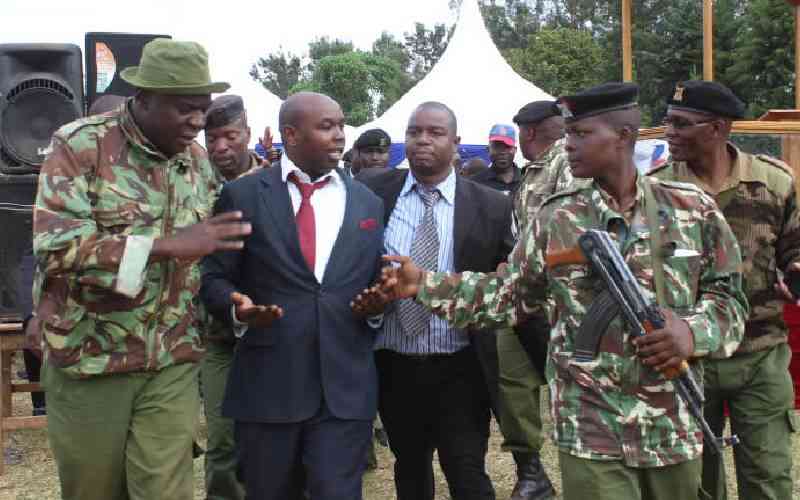
There are anxieties about the diminishing democratic space, following the announcement that Interior Cabinet Kithure Kindiki would criminalise heckling in political rallies. This comes in the same week that a watershed ruling was made nullifying subversion—a colonial relic that was used to persecute political dissidence.
Kindiki ordered the arrest of a band of youths who were suspected of heckling Prezzo Bill somewhere in his backyard of Bomet. Kithure, himself a lawyer of distinction and scholar, vowed to prosecute anyone who heckles Bill.
“It doesn’t matter whether the organisers or sponsors are pro or anti-government. We will crush them equally. Nobody is above the law,” Kindiki said while on a tour of Trans Nzoia.
Prezzo Ruto has come under immense pressure from areas that were previously considered his strongholds, as roiling swirls of humanity descend to express their outrage over a raft of policies that seem to target the poor with punitive taxes.
While heckling falls under the ambit of freedom of expression, which is protected under the Constitution, there are fears that those pushing for censure do seem to understand there is an entire political economy built around heckling.
“In a flagging economy, this is one of the growth areas,” said one analyst. “Politics is about organising and hecklers are a core component in that equation. Remove hecklers and you have no politics. I mean, political contests are determined by crowds that show up at rallies,” he said.
“Let’s not pretend that political decisions are made by analysing manifestos or lofty political speeches—many of these are plain nonsense. A pack of lies if you like. It is the delivery of crowds that carries the day. Were the crowds in uniform? Do they sing or rap in unison? Were their faces adorned with ochre and other forms of community identification? Did they blow vuvuzela or the horn? A more respectable way is to think of heckling as a performative act in political communication.”
With widespread joblessness, heckling has become a major occupation for many youth, with market rates for daily appearance going for between Sh200 and Sh500. Presidential events might fetch slightly more.
Creative display of heckling creates another tier of employment for make-up artists and fashion designers and musicians and dancers. Then there are the logistics of moving hordes of people from point A to point B.
“That means fuelling vehicles, providing security and offering cleaning services. We haven’t even mentioned food and board. On that day, even call girls and boys eat their fill,” chuckled the analyst.
It’s not clear why the government is considering criminalising heckling, but sources familiar with this development say it’s got something to do with Prezzo’s growing stature internationally.
“It doesn’t look good when you are out there, purporting to police the world, while folks can’t quite hold the peace in your backyard. Those are not good optics. It is not lost on observers that Kenya’s determined efforts to send troops to Haiti, even as the US evacuates its citizens from the island that has all but collapsed, is seen as naivety at best, and hubris at worst.
“There are folks who say we risk becoming a laughingstock of the world, even though I think we have been one for a while now, so something had to give, even if that means enacting the most useless piece of legislation.”
Another analyst saw this as a distraction. “When hecklers are being pursued and paraded before TV cameras, what else are we missing? There is something more sinister that’s going on.”
A legal expert at a leading public university was more circumspect. “I think they are avoiding a situation where political thuggery becomes entrenched.”
She elaborated: “We know the opposition is somewhat distracted right now, as Raila Odinga aka Baba pursues his African Union job. If that falls through and he returns his troops to the streets, we do need some sort of buffer,” she said, adding: “Heckling might not be such a serious offence. We might not even have a framework to punish offenders but, heck, who cares?”